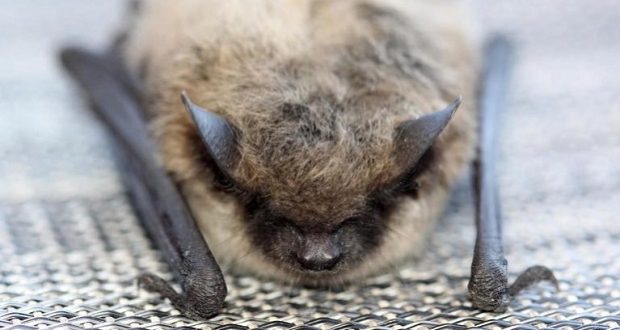MADERA – A bat found near the track at Yosemite High School has tested positive for rabies.
Kirsten Gross, Director of Madera County Animal Services, says the bat was found last week lying on the track, not moving, but still alive. It was taken to the Madera County Health Department for testing.
This is the second rabid bat reported in Madera County this year. Another was discovered in a backyard in Madera on May 14.
“Rabies is rare, but it’s a reminder that this is a serious and frightening disease,” says Gross. “There is no treatment or cure once the disease progresses in an animal or in a human; it’s fatal. Until this month, we hadn’t had a case in the city in many years. The last case was up in the mountains two years ago, in a skunk.”
The primary carriers of this deadly disease are bats, skunks, foxes and raccoons, says Gross.
“People can contract rabies from their domestic pets, which is why it’s important to make sure your pets are vaccinated against rabies.”
Gross also cautioned people against approaching or trying to help wildlife that appears to be ill or is acting in an unusual manner.
“Call police or Animal Control instead. This situation is best left to the animal control professionals to handle.”
Sara Bosse, Madera County Department of Public Health Director says, “The rabies virus is a fairly rare and often fatal disease affecting the brain. Mammals, including humans, are susceptible.”
Rabies signs include abnormal animal behaviors such as:
· Wild animals seeming unusually tame or unafraid of approaching people.
· Nocturnal animals such as skunks, foxes, or bats that are active during the day.
· Pets having difficulty walking, eating, or drinking, or whose personalities change.
· Normally docile animals acting in an agitated or aggressive manner.
· Bats that are unable to fly or have been caught by a domestic dog or cat.
The rabies virus is typically detected in skunks and bats, less often in animals like coyotes, foxes and raccoons, with domestic animals being infrequently diagnosed. The rabies virus is transmitted through the saliva of a rapid animal that bites another animal or human, or when contagious saliva infects a break in the skin or mucous membranes (eyes, mouth, nose).
If you are bitten by a wild animal, promptly wash the wound with soap and water. Immediately consult with your health care provider or Madera County Department of Public Health to determine if the wound requires further attention and whether preventive rabies treatment is required.
Reduce the risk of rabies by initially vaccinating and updating vaccinations for your pets. Unvaccinated dogs and cats exposed to a rabid animals should be euthanized immediately. Stay away from unfamiliar animals, and discourage wild animals near your home by keeping garbage in closed, secure containers and collection any uneaten pet food.
California Department of Public Health (CDPH) reported 226 confirmed animal cases of rabies statewide for 2016. Some 97 percent, or 220 of those were in wild animals. Bats represented 78 percent of those cases, skunks 14 percent, and foxes 5 percent, according the report.
Of the six remaining 2016 rabies cases, three were in domestic dogs and three cases were documented in domestic or feral cats, after those animals were thought to have come into contact with infected wild animals. One of the cases reportedly involved an indoor cat, who the owner claimed did not go outside.
Four fatal cases of rabies in humans have been reported in California in the last 10 years, the last case being in 2012 in Contra Costa County, according to the CDPH.
Rabies is deadly neurological viral disease in animals and humans that is passed through saliva and causes swelling of the brain and often presents with unusual behavioral symptoms such as aggression, confusion, biting, excessive salivation, tremors, etc. Any cat, dog or person coming into direct contact and that is scratched or bitten by a bat, or other animal carrying the rabies virus, is then also potentially exposed.
Should a person become scratched or bitten by a rabid animal, prompt medical evaluation and treatment with an antibody vaccine is necessary, and prevents the disease from progressing in most cases.
“Protect your pets and your family by getting your pets vaccinated and keep them current for rabies,” says Gross. “State law requires all dogs three months old and over be vaccinated for rabies, and then be kept up to date with those vaccinations. There is no requirement for cats, but they have as much or more exposure to bats as dogs, so it’s very important to vaccinate cats as well. It’s also important for our community, as dogs or cats are much more likely than a human to come in contact with rabid wildlife.”
Rabies vaccinations are required by law to be administered by a licensed veterinarian, and are offered at all local vets.
For more information about rabies, visit the California Department of Public Health Rabies Page at https://www.cdph.ca.gov/Programs/CID/DCDC/Pages/Rabies.aspx or the Centers for Disease Control and Prevention Rabies Page at https://www.cdc.gov/rabies/ or call Madera County Department of Public Health at (559) 675-7893.
For information on animal rabies vaccinations, call Madera County Animal Services at (559) 675-7891 or visit https://www.maderacounty.com/government/animal-services.
A low cost rabies vaccine clinic is held the first Saturday of each month, from 10 a.m. to noon, at the Madera District Fairgrounds. The clinic is sponsored by The Friends of The Madera Animal Shelter volunteers. Rabies shots are $10. The parvo/distemper combination shot is $15. All proceeds benefit the animals at the Madera County Animal Shelter.
A reduced price, walk-in shot clinic is also available at the HOPE Animal Foundation in Fresno at 5490 West Spruce Avenue, Monday – Thursday 10 a.m. until 3:30 pm. Rabies shots are $15. The parvo/distemper combination shot is $15.
Editor’s note: The bat in the photo is the same species as the rabid bat. It is not the animal found in Oakhurst.



